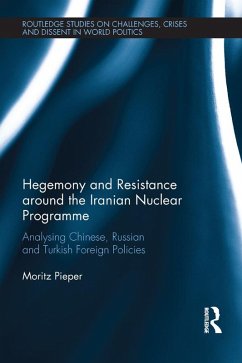This book is the first to provide comprehensive and comparative analyses to conceptualise the interaction between 'hegemonic structures' and those actors resisting them using the Iranian nuclear case as an illustration. It analyses the foreign policies of China, Russia and Turkey towards the Iranian nuclear programme and thereby answers the question to what extent these policies are indicative of a security culture that resists hegemony. Based on 70 elite interviews with experts and decision-makers closely involved with the Iranian nuclear file, it analyses resistance to hegemony across its ideational, material and institutional framework conditions.
Dieser Download kann aus rechtlichen Gründen nur mit Rechnungsadresse in A, B, BG, CY, CZ, D, DK, EW, E, FIN, F, GR, HR, H, IRL, I, LT, L, LR, M, NL, PL, P, R, S, SLO, SK ausgeliefert werden.


